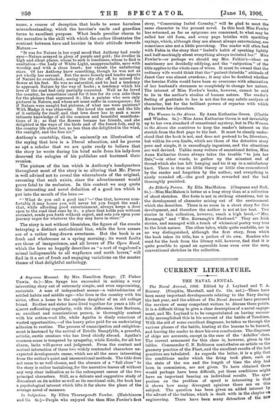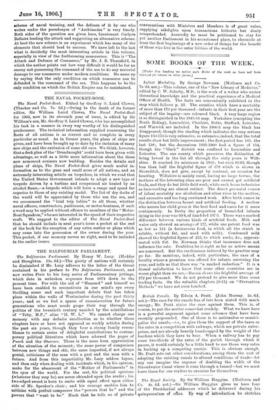CURRENT LITERATURE.
THE NAVAL ANNUAL.
The Naval Annual, 1906. Edited by J. Leyland and T. A. Brassey. (Simpkin, Marshall, and Co. 15s. net.)—There have been many important developments relating to the Navy during the last year, and the editors of The Naval Annual have procured the services of many competent writers to discuss these points. It is a difficult thing to give a clear description of a naval engage- ment, and Mr. Leyland is to be congratulated on having success- fully accomplished this in his account of the battle of Tsushima. With the aid of some excellent diagrams, he takes us through the various phases of the battle, hinting at the lessons to be learned, and leaving the reader to draw his own conclusions. The diagrams of ships are accurate, except in the case of the Achilles' class. The correct armament for this class is, however, given in the tables. Commander C. N. Robinson contributes an article on the gunnery practice of the Fleet, and the excellent results of the last practices are tabulated. As regards the latter, it is a pity that the conditions under which the firing took place, such as the state of the sea and the length of time the ship had been in commission, are not given. To have obtained these would perhaps have been difficult, yet these conditions might have an important bearing on individual results. The sym- posium on the problem of speed is interesting in that it shows how many divergent opinions there are on this subject. The question has been given an added interest by the advent of the turbine, which is dealt with in the chapter on engineering. There have been many detractors of the new scheme of naval training, and the defence of it by one who writes under the pseudonym of "Archimedes " is very timely. Both sides of the question are given here, Lieutenant Carlyon Bellaire leading the attack and suggesting an alternative scheme. At best the new scheme is an experiment which has many of the elements that should lead to success. We have left to the last what is decidedly the most interesting article in this volume, especially in view of the forthcoming manoeuvres. This is "The Attack and Defence of Commerce," by Mr. J. R. Thursfield, in which the author points out how very difficult it would be for an enemy not possessing the command of the sea to do any material damage to our commerce under modern conditions. Ile sums up by saying that the only condition on which commerce can be defended is the command of the sea. This happens to be the only condition on which the British Empire can be maintained.











































 Previous page
Previous page